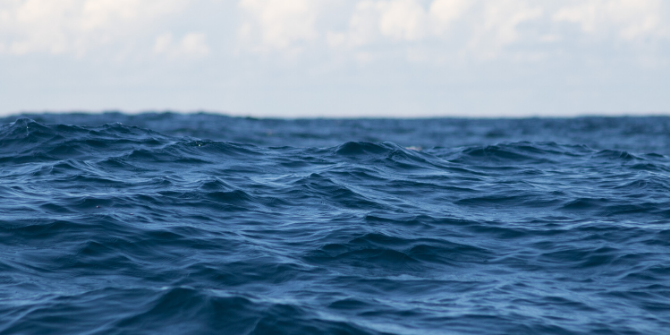Trust is often invoked as a key ingredient to establishing effective relationships between researchers, their research, and policymakers. In this post, Christopher Cvitanovic and Rebecca Shellock discuss their research on trust in practice. Drawing on their study into ICES (the International Council for the Exploration of the Seas), they outline lessons and processes in building and maintaining trust informed by the organisation’s extensive experience of connecting research to policy.
Trust underpins successful knowledge exchange among scientists and decision-makers, and thus, the attainment of research impact. However, while the importance of trust is often talked about, specific approaches to building, managing and maintaining trust at the interface of science and policy are lacking.
To address this gap, as part of a new study, we turned to the International Council for the Exploration of the Sea (ICES). Founded in 1902, ICES is arguably the world’s oldest boundary organisation, focused on improving knowledge exchange among marine science and policy to support evidence-informed decision-making processes, as such it has a deep institutional knowledge of engaging with policy internationally. For the purpose of our research we focused specifically on ICES members who are directly involved in the translation of ICES science into advice. This included (i) employees of the ICES secretariat (i.e. those employed by ICES who are responsible for overseeing ICES processes) and (ii) annually active members of the ICES community (i.e. key members of ICES working groups to develop advice). Here, we share our key findings, and provide practical and implementable strategies that can be used by scientists and/or research institutions to help them foster trust.
Trust – critical, dynamic, fragile
All participants of our study considered trust as critically important for successful knowledge exchange. This was highlighted by one participant who stated that trust is: ‘…the alpha and the omega. It’s everything. Without trust, you don’t have anything’.
However, to talk about trust in the abstract can be unhelpful, trust in practice requires actors and context. We identified three levels at which trust is important:
- Trust between individuals (e.g. an individual researcher and an individual policy-maker), which was considered to be critical for providing space for open, interactive and honest dialogue.
- Trust in the organisation, which was focused on organisational legitimacy and credibility, and acting in a way that is free of bias.
- Trust in the process of generating and exchanging knowledge.
While discussing the importance of trust at the interface of science and policy, participants in our research also noted the highly fragile and dynamic nature of trust. Establishing trust is an ongoing process, rather than a singular achievement. As stated by one research participant: ‘[We] might be in a trusted position now, but don’t forget, one huge mistake and you can lose it, or one small mistake that grows into a bigger mistake, and you will lose it’. While participants discussed the considerable time needed to build trust, they also noted the much quicker speed in which it can be lost or eroded – as little as a number of days.
Strategies for building trust
In total our study identified 14 specific strategies and considerations for building trust (Fig.1). Of these the most frequently discussed was the need for transparency across all processes related to knowledge production and exchange. This was highlighted by one participant who said that: ‘Transparency is hugely important, and it will become more and more so. In this time of populist politicians and fake news, if you cannot demonstrate transparency throughout all parts of the process you will be considered untrustworthy….and it’s not just about perceived transparency, but actual transparency’. Specific approaches for ensuring transparency included, among others, having an inclusive and participatory processes that includes diverse stakeholders, and clearly acknowledging and articulating the limitations of knowledge generating processes.
Figure 1: Fourteen strategies identified through a case study of ICES for building trust at the interface of environmental science and policy, as published in Cvitanovic et al (2021).
Not advocating for a specific outcome was the next most frequently identified consideration when trying to build trust at the interface of science and policy. This was highlighted by one participant who said: ‘Our job is not to say what they should do, but to present them with an unbiased summary form the evidence base, explain the potential consequences of any actions they may take based on that evidence, and then let them deal with it as they want’.
Other commonly discussed strategies for building trust included having regular contact with stakeholders, being able to demonstrate independence, and acknowledging any risks associated with the knowledge production process. In relation to regular contact, participants emphasised that trust is most effectively built through regular face-to-face engagement, preferably in both formal and informal settings. The ability to demonstrate independence related to the need to work with numerous stakeholders (e.g. science, policy, industry, non-governmental organisations, etc.), at multiple levels (national, regional, international) and to be able to demonstrate that actions are not driven by the values or goals of any particular stakeholder group. Acknowledging risks is closely related to transparency (discussed above), and relates to clearly articulating any limitations associated with the knowledge generation process, such as a lack of data.
Repairing damaged trust
As highlighted above, while our study showed that trust is critical for effective knowledge exchange at the interface of science and policy to support research impact, it is also dynamic and fragile. Reflecting on their involvement in ICES, and particularly situations where trust with decision-makers had been compromised in the past, participants of our study identified five key steps to trust repair, and specific considerations for each step, as summarised in Fig.2.
Figure 2: The five stages of trust repair, and accompanying actions, identified through this study of ICES, as published in Cvitanovic et al (2021).
From organisations to individuals
Through our case study of ICES we have highlighted the importance and fragility of trust at the interface of science and policy, and identified specific strategies with key actions to establish and manage trust between trustor and trustee. While organisations must have the policies, processes and structures in place to enable the formation of trust, our results also highlight the specific role of individuals (e.g. that make up a research team) for also taking action to build and manage trust. Thus, in presenting these insights, we hope to have provided practical guidance that can be used by scientists and/or research institutions to help them foster trust with decision-makers, enable improved knowledge exchange and build capacity for evidence-informed decision-making processes.
This post draws on the authors’ co-authored article, Strategies for building and managing ‘trust’ to enable knowledge exchange at the interface of environmental science and policy, published in Environmental Science and Policy.
Note: This article gives the views of the authors, and not the position of the Impact of Social Science blog, nor of the London School of Economics. Please review our Comments Policy if you have any concerns on posting a comment below.
Featured image credit adapted from NOAA via Unsplash.









